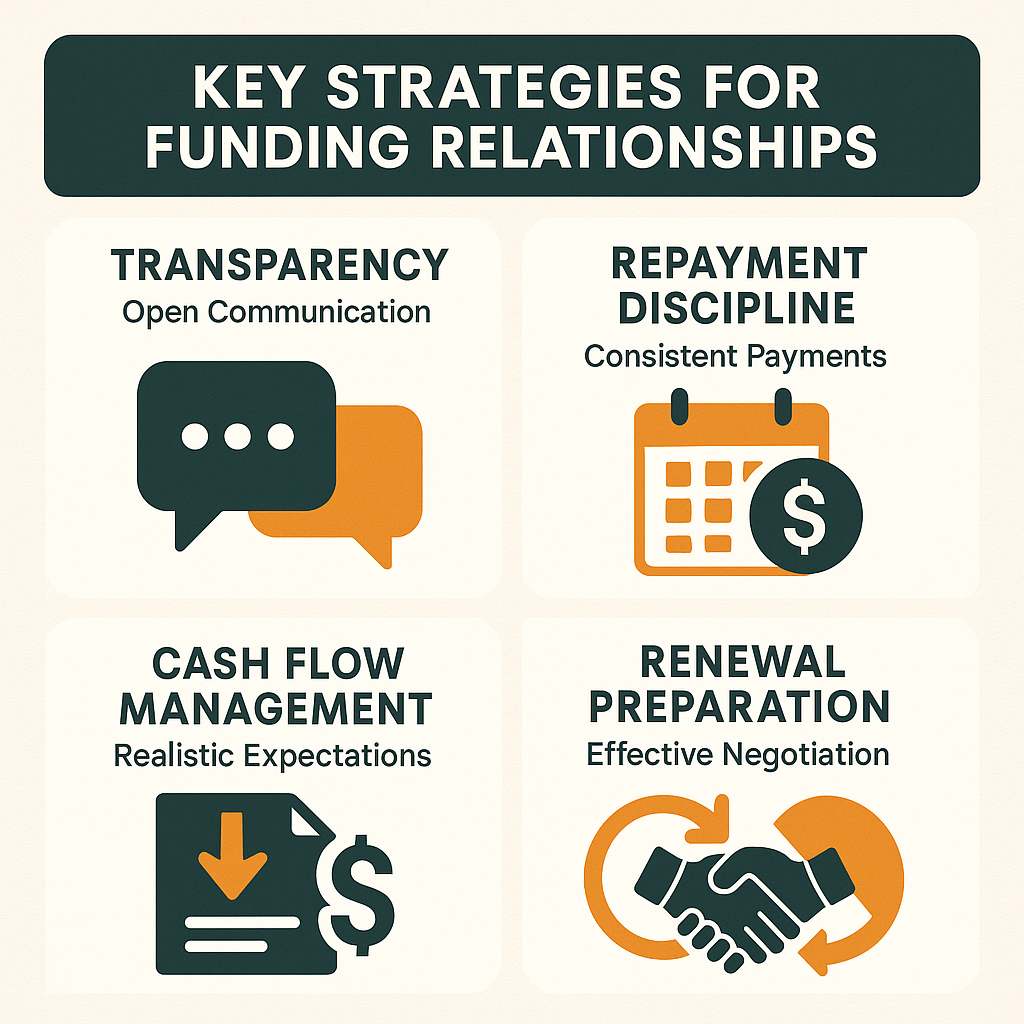How to Maintain Funding Relationships
Building strong relationships with funding partners isn't just about getting approved for an advance or securing initial financing. The real value comes from maintaining those connections over time, creating a foundation for future funding opportunities and better terms. When merchants understand how to maintain funding relationships effectively, they often find themselves with more options, faster approvals, and improved access to capital when they need it most.
Whether you're working with merchant cash advance providers, alternative lenders, or traditional financial institutions, the principles remain similar. Success depends on transparency, consistent communication, disciplined repayment practices, and proactive planning for future needs. Let's explore the strategies that can help you build lasting partnerships with your funding sources.
Building Trust Through Transparency

Building trust through transparency, communication forms the cornerstone of any successful funding relationship. When merchants maintain open communication channels with their funders, they create an environment where both parties can work together effectively, even when challenges arise.
- Share business updates regularly: Keep your funding partner informed about significant changes in your business, whether positive developments like new contracts or concerning trends like seasonal slowdowns. This proactive approach demonstrates professionalism and helps prevent surprises.
- Provide accurate financial information: Always submit honest and complete financial documentation when requested. Attempting to hide problems or inflate numbers typically backfires and damages the relationship permanently.
- Communicate challenges early: If you anticipate cash flow issues or operational difficulties, reach out to your funder immediately. Most funding partners appreciate early warning and may offer solutions or modifications to help you through tough periods.
- Maintain consistent reporting standards: Establish regular reporting practices and stick to them. Whether monthly updates or quarterly reviews, consistency in communication helps build confidence in your management capabilities.
Effective Communication Strategies
Effective communication strategies can make the difference between a transactional relationship and a true partnership with your funding source. The way you interact with your funder sets the tone for the entire relationship and influences their willingness to work with you long-term.
- Establish preferred communication channels: Determine whether your funder prefers email, phone calls, or written reports for different types of communication. Some issues might require immediate phone contact, while routine updates can be handled through email.
- Respond promptly to requests: When your funding partner asks for information or documentation, provide it as quickly as possible. Delays in response time can signal problems or lack of organization, even when that's not the case.
- Be specific and detailed: Vague responses or incomplete information create confusion and may require follow-up conversations. Clear, detailed communication saves time for both parties and demonstrates professionalism.
- Schedule regular check-ins: Don't wait for problems to arise before contacting your funder. Regular check-ins, even when things are going well, help maintain the relationship and keep communication lines open.
Maintaining Repayment Discipline
Maintaining repayment discipline represents one of the most critical aspects of preserving strong funding relationships. Your repayment history becomes the foundation upon which future funding decisions are made, and consistent performance in this area can lead to better terms and increased access to capital.
- Understand your repayment structure: Whether you're dealing with daily debits from a merchant cash advance or monthly payments on term financing, make sure you fully understand when and how payments are collected. This knowledge helps you manage cash flow more effectively.
- Monitor account balances closely: Keep sufficient funds in your business account to cover scheduled payments. Returned payments or insufficient funds can damage your relationship and may trigger penalty fees or acceleration clauses.
- Plan for seasonal fluctuations: If your business experiences seasonal ups and downs, work with your funder to understand how these changes might affect repayment and discuss potential adjustments before problems arise.
- Address payment issues immediately: If you cannot make a scheduled payment, contact your funder before the payment date. Many funding partners are willing to work with merchants who communicate proactively about temporary difficulties.
Managing Cash Flow Expectations
Managing cash flow expectations helps create realistic partnerships between merchants and funders. When both parties understand the business's financial rhythms and challenges, they can work together more effectively to ensure successful repayment and continued access to funding.
- Document seasonal patterns: Keep records of how your business performs during different times of the year. This information helps funders understand your natural cash flow cycles and can influence their willingness to provide funding during traditionally slower periods.
- Maintain financial cushions: Try to keep some cash reserves available for unexpected expenses or temporary revenue dips. This buffer helps ensure you can meet repayment obligations even when business conditions become challenging.
- Plan major expenses carefully: Large equipment purchases, renovations, or inventory investments can impact your ability to service existing funding. Discuss these plans with your funder to ensure they understand how these investments might affect cash flow.
- Monitor key performance indicators: Track metrics like daily sales, average transaction size, and customer traffic patterns. Changes in these indicators can signal potential cash flow issues before they become serious problems.
Preparing for Renewal Discussions
Preparing for renewal discussions positions merchants to secure continued funding on favorable terms. The approach you take to these conversations can significantly influence your funder's willingness to extend additional capital and may impact the terms offered for future advances or financing arrangements.
- Compile performance documentation: Gather records showing how well you've managed previous funding arrangements, including repayment history, revenue growth, and operational improvements. This documentation demonstrates your reliability as a funding partner.
- Assess your current financial position: Review your financial statements, cash flow projections, and business performance metrics. Understanding your current position helps you present realistic funding needs and repayment capabilities.
- Define specific funding needs: Be clear about why you need additional funding and how you plan to use it. Whether for inventory, equipment, expansion, or working capital, specific plans demonstrate thoughtful business management.
- Research market conditions: Understanding current funding market conditions and typical terms can help you negotiate more effectively and set appropriate expectations for renewal discussions.
- Consider timing carefully: Approach renewal discussions when your business is performing well and you have sufficient time to explore alternatives if needed. Rushing into renewal talks from a position of weakness limits your negotiating power.
Success in maintaining funding relationships comes down to treating your funders as true business partners rather than just sources of capital. By focusing on transparency, maintaining open communication, demonstrating repayment discipline, and preparing thoughtfully for future funding needs, you create a foundation for long-term success.
Remember that strong funding relationships take time to develop but can provide significant benefits over the years. Merchants who invest in these partnerships often find themselves with better access to capital, more favorable terms, and greater flexibility when business conditions change. The effort you put into maintaining these relationships today can pay dividends in your business's future growth and stability.

.png)






